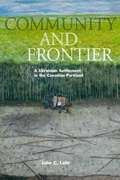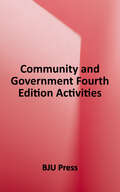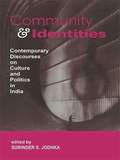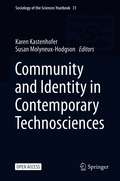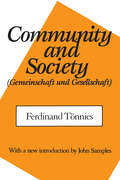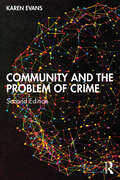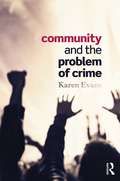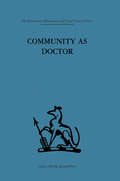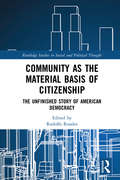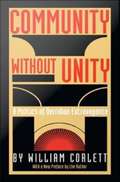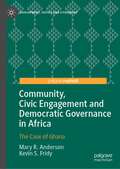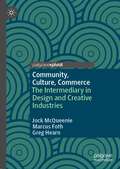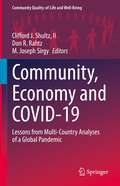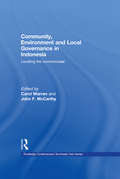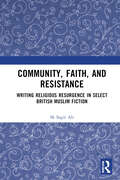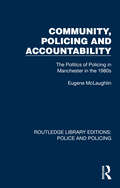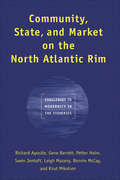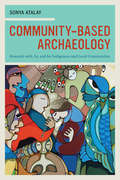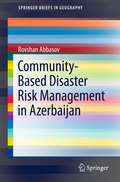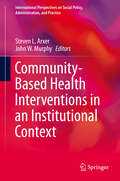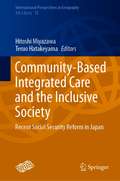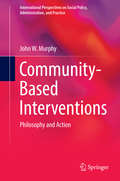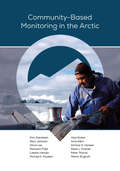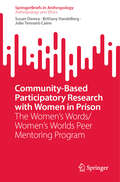- Table View
- List View
Community and Frontier: A Ukrainian Settlement in the Canadian Parkland (Studies in Immigration and Culture #6)
by John C. LehrA social and economic history of one of the oldest Ukrainian settlements in Western Canada. Established in 1896, the Stuartburn colony was one of the earliest Ukrainian settlements in western Canada. Based on an analysis of government records, pioneer memoirs, and the Ukrainian and English language press, Community and Frontier is a detailed examination of the social, economic, and geographical challenges of this unique ethnic community. It reveals a complex web of inter-ethnic and colonial relationships that created a community that was a far cry from the homogeneous ethnic block settlement feared by the opponents of eastern European immigration. Instead, ethnic relationships and attitudes transplanted from Europe affected the development of trade within the colony, while Ukrainian religious factionalism and the predatory colonial attitudes of mainstream Canadian churches fractured the community and for decades contributed to social dysfunction.
Community and Government Activities (Heritage Studies #2)
by BJUPressCommunity and Government Activities, 4th edition provides overprint answers to all activities in the corresponding activities.
Community and Identities
by Surinder S JodhkaThis important volume of original essays interrogates contemporary debates, popular as well as academic, on the place of communities and cultural identities in India's polity. In particular the contributors: - analyse some of the emerging concerns in the social and political life of contemporary India - deal with issues that are central to recent debates among social and political theorists, that is, community, identity, nation and civil society - present fresh perspectives on these issues which are of interest to most developing societies
Community and Identity in Ancient Egypt
by Deborah VischakThis book examines a group of twelve ancient Egyptian tombs (ca. 2300 BCE) in the elite Old Kingdom cemetery of Elephantine at Qubbet el-Hawa in modern Aswan. It develops an interdisciplinary approach to the material - drawing on methods from art history, archaeology, anthropology, and sociology, including agency theory, the role of style, the reflexive relationship between people and landscape, and the nature of locality and community identity. A careful examination of the architecture, setting, and unique text and image programs of these tombs in context provides a foundation for considering how ancient Egyptian provincial communities bonded to each other, developed shared identities within the broader Egyptian world, and expressed these identities through their personal forms of visual and material culture.
Community and Identity in Contemporary Technosciences (Sociology of the Sciences Yearbook #31)
by Karen Kastenhofer Susan Molyneux-HodgsonThis open access edited book provides new thinking on scientific identity formation. It thoroughly interrogates the concepts of community and identity, including both historical and contemporaneous analyses of several scientific fields. Chapters examine whether, and how, today’s scientific identities and communities are subject to fundamental changes, reacting to tangible shifts in research funding as well as more intangible transformations in our society’s understanding and expectations of technoscience. In so doing, this book reinvigorates the concept of scientific community. Readers will discover empirical analyses of newly emerging fields such as synthetic biology, systems biology and nanotechnology, and accounts of the evolution of theoretical conceptions of scientific identity and community. With inspiring examples of technoscientific identity work and community constellations, along with thought-provoking hypotheses and discussion, the work has a broad appeal. Those involved in science governance will benefit particularly from this book, and it has much to offer those in scholarly fields including sociology of science, science studies, philosophy of science and history of science, as well as teachers of science and scientists themselves.
Community and Society
by Ferdinand Tonnies C.P. LoomisThis extraordinary prescient work by Ferdinand Toennies was written in 1887 for a small coterie of scholars, and over the next fifty years continued to grow in importance and adherents. Its translator into English, Charles P. Loomis, well described it as a volume which pointed back into the Middle Ages and ahead into the future in its attempt to answer the questions: "What are we? Where are we? Whence did we come? Where are we going?" If the questions seem portentous in the extreme, the answers Toennies provides are modest and compelling. Every major field from sociology, to psychology, to anthropology, has found this to be a praiseworthy book. The admirable translation by Professor Loomis did much to transfer praise for the Toennies text from the German to the English-speaking world. Now, outfitted with a brilliant new opening essay by John Samples, the author of a recent full-scale biographical work on Toennies, 'Community and Society' is back in print; a welcome reminder of the glorious past of German social science.
Community and the Problem of Crime
by Karen EvansThis book offers a useful theoretical overview of key approaches to the subject of crime and community and considers the ways in which these have been applied in more practical settings. Written by an expert in the field and drawing on a range of international case studies from Europe, North America, Australia and Asia, this book explores both why and how crime and community have been linked and the implications of their relationship within criminology and crime prevention policy. Topics covered in the book include: the different crime prevention paradigms which have been utilized in the ‘fight against crime’ the turn to community in crime prevention policy, which took place during the 1980s in the UK and US, and its subsequent development the theoretical and ideological underpinnings to crime prevention work in and with different communities the significance and impact of fear of crime on crime prevention policy different institutional responses to working with community in crime prevention and community safety the ways in which the experiences of the UK and US have been translated into the European context a comparison between traditional western responses to the growing interest in restorative and community-based approaches in other regions. The new edition has been fully revised and updated to include discussion of the rise of populist politics and the centrality of ‘crime’ and ‘disorder’ as a divisive element used in populist political rhetoric; the politics of austerity and the management of crises – economic, environmental and COVID-19 and the subsequent lockdowns; the impact of Black Lives Matter, MeToo and Extinction Rebellion; the significance of social media and virtual community; the further erosion of civil liberties and the right to protest; and racialized US policing practices and police-related deaths. This book offers essential reading for students taking courses on crime and community, crime prevention and community safety and community corrections.
Community and the Problem of Crime
by Karen EvansThe relationship between crime and community has a long history in criminological thought, from the early notion of the criminogenic community developed by the Chicago sociologists through to various crime prevention models in research and policy. This book offers a useful theoretical overview of key approaches to the subject of crime and community and considers the ways in which these have been applied in more practical settings.Written by an expert in the field and drawing on a range of international case studies from Europe, North America, Australia and Asia, this book explores both why and how crime and community have been linked and the implications of their relationship within criminology and crime prevention policy. Topics covered in the book include: the different crime prevention paradigms which have been utilised in the 'fight against crime', the turn to community in crime prevention policy, which took place during the 1980s in the UK and US and its subsequent development, the particular theoretical and ideological underpinnings to crime prevention work in and with different communities, the significance and impact of fear of crime on crime prevention policy, different institutional responses to working with community in crime prevention and community safety, the ways in which the experience of the UK and US have been translated into the European context, a comparison between traditional Western responses to the growing interest in restorative and community-based approaches in other regions. This book offers essential reading for students taking courses on crime and community, crime prevention and community safety, and community corrections.
Community as Doctor: New perspectives on a therapeutic community (Historical Issues In Mental Health Ser.)
by Rhona Rapoport Robert N. Rapoport Irving RosowTavistock Press was established as a co-operative venture between the Tavistock Institute and Routledge & Kegan Paul (RKP) in the 1950s to produce a series of major contributions across the social sciences. This volume is part of a 2001 reissue of a selection of those important works which have since gone out of print, or are difficult to locate. Published by Routledge, 112 volumes in total are being brought together under the name The International Behavioural and Social Sciences Library: Classics from the Tavistock Press. Reproduced here in facsimile, this volume was originally published in 1960 and is available individually. The collection is also available in a number of themed mini-sets of between 5 and 13 volumes, or as a complete collection.
Community as the Material Basis of Citizenship: The Unfinished Story of American Democracy (Routledge Studies in Social and Political Thought)
by Rodolfo RosalesCommunity as the Material Basis of Citizenship addresses community as the site of participation, production, and rights of citizens and brings to bear a profound critique of a collective process that has historically excluded working class communities and communities of color from any real governance. The argument is that the status of citizenship has been influenced by a society that emphasizes the role of property in defining legitimacy and power and therefore idealizes and institutionalizes citizenship from an individualistic perspective. This system puts the onus on the individual citizen to participate in their governance, while the political reality is that organizations and corporations and their interests have great power to influence and govern. The chapters present an exciting departure from the long-standing traditions of the social basis of citizenship. In Community as the Material Basis of Citizenship, Rodolfo Rosales and his contributors argue that citizenship is a communally embedded and/or socially constituted phenomenon. Hence, the unfinished story of American Democracy is not in the equalization of communities but rather in their ability to participate in their own governance – in their empowerment.
Community without Unity: A Politics of Derridian Extravagance
by William CorlettWinner of the 1990 Foundations of Political Theory Section of the American Political Science Association "First Book Award" Now available in paperback with a new preface by the author, this award-winning book breaks new ground by challenging traditional concepts of community in political theory. William Corlett brings the diverse (and sometimes contradictory) work of Foucault and Derrida to bear on the thought of Pocock, Burke, Lincoln, and McIntyre, among others, to move beyond the conventional dichotomy of "individual vs. community," arguing instead that community is best advanced within a politics of difference.
Community, Civic Engagement and Democratic Governance in Africa: The Case of Ghana (Development, Justice and Citizenship)
by Mary R. Anderson Kevin S. FridyThis book explores how community influences civic engagement, focusing on the case of Ghana. It offers an interdisciplinary perspective to those studying psychology, political development and civic engagement in African countries. Previous research has shown that the social and economic context in which an individual interacts influences their political behaviors and attitudes, and that personal characteristics account for differences in political behavior and attitudes. This work moves away from the cultural demographics of a person, which often take center stage in existing investigations of partisan political behavior in the African context, and addresses the following five questions: (1) To what extent do individual traits influence civic engagement in Ghana? (2) To what extent is community identity similar or different in small rural villages versus large metropolitan areas in Ghana and how does community identity influence civic engagement? (3) To what extent does trust influence civic engagement in Ghana? (4) What factors and activities influence political knowledge and how does political knowledge influence civic engagement? (5) What is the status of women in civic engagement?
Community, Culture, Commerce: The Intermediary in Design and Creative Industries
by Marcus Foth Greg Hearn Jock McQueenieAs digital environments become increasingly individualised, instant, ubiquitous, and disintermediated, this book demonstrates the continuing relevance of intermediaries at the intersection of design, creativity, community engagement, and corporate social responsibility. The authors examine intermediaries as enablers of mutual benefit and offer a proactive, interventionist, and holistic approach to intermediation practice that steps beyond design thinking. By means of case studies that employ the 3C project design methodology—Community, Culture, Commerce—the authors provide an accessible introduction to intermediation at the nexus of theory and practice and signpost new opportunities for researchers and practitioners in the post-COVID environment.
Community, Economy and COVID-19: Lessons from Multi-Country Analyses of a Global Pandemic (Community Quality-of-Life and Well-Being)
by M. Joseph Sirgy Don R. Rahtz Clifford J. Shultz IIThis volume explores the impact of the COVID-19 pandemic on the health, safety, and socioeconomic well-being of community residents of selected countries around the world. It is built on an overarching framework of studying community well-being, applied here to the analyses of one of the most significant crises of our time. Most important are the lessons learned from the experiences in these countries – including insights and recommendations on how to mitigate future pandemics. Building on years of research, each chapter is written by an accomplished scholar with interests and expertise on various assessments of community well-being development in the country of study. The authors share cases and analyses, and highlight failures and successes; they offer sound policy recommendations on how to restore the health, safety, and multidimensional wellness of community residents, and how to decrease the likelihood and impact of future crises. Some of the policy recommendations in this multi-country compendium can be used to assist crisis prevention and recovery, beyond pandemics. The volume shows how the lessons learned and shared from community responses to the pandemic can provide critical and useful policy insights to shape best practices in mitigating other disasters like hurricanes, floods, earthquakes, tornadoes, wars, riots, acts of domestic and international terrorism, weapons of mass destruction and industrial accidents. This is a must-read for researchers across the social sciences, health sciences, and management studies, and for government and non-government professionals involved in community health and well-being.
Community, Environment and Local Governance in Indonesia: Locating the commonweal (Routledge Contemporary Southeast Asia Series)
by Carol Warren John F. McCarthyThis book explores the forces reconfiguring local resource governance in Indonesia since 1998, drawing together original field research undertaken in a decade of dramatic political change. Case studies from across Indonesia’s diverse cultural and ecological landscapes focus on the most significant resource sectors – agriculture, fisheries, forestry, mining and tourism –providing a rare in-depth view of the dynamics shaping social and environmental outcomes in these varied contexts. Debates surrounding the ‘tragedy of the commons’ and environmental governance have focused on institutional considerations of how to craft resource management arrangements in order to further the policy objectives of economic efficiency, social equity and environmental sustainability. The studies in this volume reveal the complexity of resource security issues affecting local communities and user groups in Indonesia as they engage with wider institutional frameworks in a context driven simultaneously by decentralizing and globalizing forces. Through ground up investigations of how local groups with different cultural backgrounds and resource bases are responding to the greater autonomy afforded by Indonesia’s new political constellation, the authors appraise the prospects for rearticulating governance regimes toward a more equitable and sustainable ’commonweal’. This volume offers valuable insights into questions of import to scholars as well as policy-makers concerned with decentralized governance and sustainable resource management.
Community, Faith, and Resistance: Writing Religious Resurgence in Select British Muslim Fiction
by Sk Sagir AliThis book looks at texts produced before and after 9/11 by novelists with Muslim backgrounds in Britain. It delves into the ways in which the politics of representation have changed in the wake of 9/11 and highlights the conflicts that arise in these coming-of-age narratives between the demands of a liberal individualist lifestyle and those of community, family, and faith. Drawing on the works of Salman Rushdie, Hanif Kureishi, Nadeem Aslam, Qaisra Shahraz, Leila Aboulela, Robin Yassin-Kassab, Zia Haider Rahman, and Ahdaf Soueif, Community, Faith, and Resistance discusses how these authors distinguish between Islam as a religion and Islam as a culture and negotiate complex themes of religion, representation, recognition, and secularism in their works.The volume will be of great interest to scholars and researchers, particularly those focused on literature, politics, cultural studies, South Asian studies, Islamic studies, and decolonial studies, providing valuable insights and fostering deeper understanding in these disciplines.
Community, Policing and Accountability: The Politics of Policing in Manchester in the 1980s (Routledge Library Editions: Police and Policing)
by Eugene McLaughlinOriginally published in 1994, this work examines the different models of police accountability that were implemented in the 1980s. Based on research carried out in Manchester, the work discusses local government efforts to construct a new social contract between the police and the community. The research is considered within the wider theoretical debates about the nature of participatory democracy. The conclusion argues that there is an urgent need to confront the complexities of constructing satisfactory police-community relations in Britain's inner cities. It evaluates whether the reorganization of policing at the time would lead to a more accountable police service. It was one of the first books in this country to argue for an abolitionist position that is now central to BLM debates. Today it can be read against the backdrop of ongoing debates of police accountability and police race relations.
Community, State, and Market on the North Atlantic Rim: Challenges to Modernity in the Fisheries
by Bonnie Mccay Svein Jentoft Gene Barrett Knut Mikalsen Leigh Mazany Petter Holm Richard ApostleThis is a study of Northern Norway and Atlantic Canada, two regions experiencing a severe crisis due to overexploitation of fisheries resources. The work of a group of researchers from Canada, Norway, and the United States, it examines the implications of common market integration, privatized resource management, and small business development policies for fishery-dependent communities in terms of long-term sustainability and participatory democracy. The book is broken into three sections: an examination of the economic and institutional history of the fisheries in Norway and Atlantic Canada, a study of the regulatory regimes used in the fisheries of these two regions, and an analysis of reactions in three communities, two in Canada and one in Norway, to the decline and collapse of fish stocks. Comparative, multidisciplinary, and multinational in approach, it is a major contribution to the literature on fishing regulations, the role of the state, and resource development in the North Atlantic.
Community-Based Archaeology
by Sonya AtalayArchaeology impacts the lives of indigenous, local, or descendant communities. Yet often these groups have little input to archaeological research, and its results remain inaccessible. As archaeologists consider the consequences and benefits of research, the skills, methodologies, and practices required of them will differ dramatically from those of past decades. As an archaeologist and a Native American, Sonya Atalay has investigated the rewards and complex challenges of conducting research in partnership with indigenous and local communities. In Community-Based Archaeology, she outlines the principles of community-based participatory research and demonstrates how CBPR can be effectively applied to archaeology. Drawing on her own experiences with research projects in North America and the Near East, Atalay provides theoretical discussions along with practical examples of establishing and developing collaborative relationships and sharing results. This book will contribute to building an archaeology that is engaged, ethical, relevant, and sustainable.
Community-Based Disaster Risk Management in Azerbaijan (SpringerBriefs in Geography)
by Rovshan AbbasovThis book illustrates the main factors of vulnerability and gives a clear picture about the possible interventions to reduce disaster risks both in schools and communities in Azerbaijan. A new methodology for child centered vulnerability assessments both on school and community levels has been developed. This methodology can be used to assess the level of vulnerability of schools and communities. The book is a newly prepared training manual which will help practitioners conduct trainings for government and community organizations. While the book is focused on a specific region, the suggested approach is generic and can be used elsewhere.
Community-Based Health Interventions in an Institutional Context (International Perspectives on Social Policy, Administration, and Practice)
by John W. Murphy Steven L. ArxerCommunity-Based Health Interventions in an Institutional Context examines challenges of "institutionalizing" community-based health care. While the community-based or localized model is growing in popularity and importance in the United States, in practice it must often be brought in to larger institutions in order to grow to scale. The typical goals of an institution—standardization, formalization, and control—may be seen as antithetical to those of a community-based healthcare provider, such as spontaneity, customization, and flexibility. The contributions to this work raise questions about how the community-based model can be scaled up through institutions, and how "institutionalization" can be rethought from a bottom-up approach. They provide not only an overview of community-based organizations, but also delve into practical topics such as establishing budgets, training workers, incorporating technology, as well as more theoretical topics like goal-setting, policy effects (like the ACA), and relationships between patient and community. This work will be of interest for researchers interested in exploring the community-based health care model, as well as practitioners in health care and health policy.
Community-Based Integrated Care and the Inclusive Society: Recent Social Security Reform in Japan (International Perspectives in Geography #12)
by Hitoshi Miyazawa Teruo HatakeyamaThis book discusses the building of comprehensive community support systems, which constitutes a key issue in social security reforms in Japan. The book comprises three parts: (I) Mapping Social Security in Japan, (II) Community-Based Integrated Care Systems in Japan, and (III) A Prospect of Community-Based Inclusive Society in Japan. The chapters in this book were composed on the basis of research into community-based integrated care systems and community-based inclusive society, conducted by members of the Association of Japanese Geographers’ Study Group “Regional Issues Related to the Birthrate Decline and Population Aging.” Choosing local governments with different regional characteristics, the authors conducted empirical research to uncover the characteristics of comprehensive community support systems, building processes, and challenges in the respective local governments. Non-Japanese readers will acquire an understanding of the characteristics of social security and the trends of the reforms in Japan. To support its use as a reference book, chapters in Part I include numerous maps and figures with the themes of welfare, medical care, and health levels in Japan.
Community-Based Interventions: Philosophy and Action (International Perspectives on Social Policy, Administration, and Practice)
by John W. MurphyFor decades, community-centered social services have been promoted as an admirable ideal. Yet the concept of decentralized services delivered where people live has proved to be an elusive ideal as well, with the promise of empowerment often giving way to disinterest and apathy. Community-Based Interventions examines the reasons community programs tend to founder and proposes a realistic framework for sustained success. The book's theoretical, philosophical and political foundations begin with the importance of context, as in local knowledge and community self-definition and engagement. Innovative, often startling, approaches to planning, design and implementation begin with the recognition that communities are not "targets" or "locations" to be "fixed," but social realities whose issues require concrete answers. The variety of examples described in these chapters demonstrate the power of community interventions in providing effective services, reducing inequities and giving individuals greater control over their health, their environment and in the long run, their lives. Included in the coverage: Redefining community: the social dimensions. A new epidemiology to inform community work. The role of research in designing community interventions. The conceptual flow of a community-based project. Building autonomy through leadership from below. Relating social interventions to social justice. Attuned to the current era of health and mental health reform, Community-Based Interventions represents a major step forward in its field and makes an inspiring text for social workers, clinical social workers, public health administrators and community activists.
Community-Based Monitoring in the Arctic (Alaska)
by Olivia Lee Hajo Eicken Finn Danielsen Noor Johnson Maryann Fidel Lisbeth Iversen Michael K. Poulsen Ania Albin Simone G. Hansen Peter L. Pulsifer Peter Thorne Martin EnghoffCommunity Based Monitoring Programs in the Arctic explores the concept and use of community-based monitoring (CBM) of ecological conditions in the Arctic. The authors analyze current programs and determines that CBM, while widespread and effective, nonetheless still has untapped potential. Presenting numerous examples and substantial data from a pan-Arctic survey and several workshops around the Arctic, Ths book offers a state of the field and a guide for mapping out the next steps. Contributors include Finn Danielsen, Noor Johnson, Olivia Lee, Maryann Fidel, Lisbeth Iversen, Michael K. Poulsen, Hajo Eicken, Ania Albin, Simone G. Hansen, Peter L. Pulsifer, Peter Thorne, and Martin Enghoff.
Community-Based Participatory Research with Women in Prison: The Women’s Words/Women’s Worlds Peer Mentoring Program (SpringerBriefs in Anthropology)
by Susan Dewey Brittany VandeBerg Julie Tennant-CaineThis innovative work tells the story of a unique partnership between a state prison administration and a team of incarcerated women, prison administrators, researchers, artists, and students known as The WoW Collective due to their joint efforts in developing a peer mentoring program called “Women’s Words/Women’s Worlds (WoW).” Using the example of WoW, the book provides a guide to doing community-based participatory research (CBPR) with women in prison that takes a collaborative—rather than the typically adversarial—approach to working together toward the goal of transformative social change. This book provides a ground-breaking example of how incarcerated women, prison administrators, researchers, and artists successfully worked together on a community-based project that led to meaningful results in the form of a peer mentoring program designed by women in prison for women in prison. Remaining closely attuned to the ethical dimensions of doing CBPR in a highly structured prison environment, this book provides inspiration to CBPR practitioners who seek to work within the criminal justice system to create real and meaningful change for the better. Co-authored by two criminologists, a senior prison administrator, and the unique collective known as WoW, this book provides both a clear step-by-step CBPR guide and a visionary approach to working with criminal justice practitioners.
